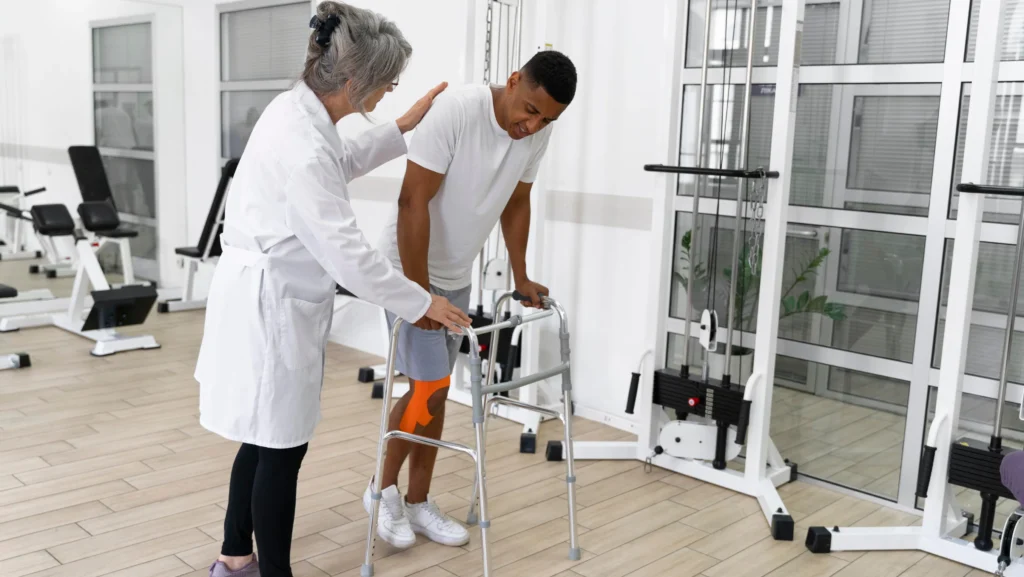What is Cancer Rehabilitation?
Cancer rehabilitation is a comprehensive healthcare process designed to help individuals overcome the physical, emotional, and cognitive challenges caused by cancer and its treatments. It focuses on restoring function, reducing disability, and improving overall quality of life. This multidisciplinary approach is crucial as cancer and its therapies—such as surgery, chemotherapy, and radiation—often result in fatigue, pain, decreased mobility, and psychological distress. Rehabilitation in Chennai has developed specialized programs that cater to these needs, combining physical therapy, occupational therapy, counseling, and nutritional guidance tailored to individual patient profiles.
The objective of cancer rehabilitation extends beyond managing symptoms; it supports patients in regaining independence and reintegrating into daily life. It also addresses the unique needs of women and children, with Top Rehabilitation Centres For Women in Chennai offering gender-specific care, while Pediatric Rehabilitation In Vadapalani focuses on young patients requiring developmental support.
This integrated care model ensures that each patient receives personalized treatment plans, optimizing recovery and helping them adapt to new physical or psychological realities. By involving patients actively in their recovery, Rehabilitation in Chennai empowers them to navigate life after cancer more confidently, enhancing long-term well-being and resilience.
What Symptoms Can Cancer Rehab Help With?
Cancer rehabilitation addresses a broad spectrum of symptoms and complications arising from cancer and its treatments. These symptoms often interfere with daily activities and reduce overall quality of life, making rehabilitation essential.
- Fatigue: One of the most common symptoms, cancer-related fatigue is more intense than regular tiredness and affects physical and mental performance. Rehabilitation in Chennai incorporates energy conservation techniques and graded exercise to manage this symptom effectively.
- Pain Management: Chronic pain due to surgery, nerve damage, or tumors is treated with physical therapy modalities, medications, and counseling.
- Mobility Issues: Weakness, loss of limb function, or balance problems can arise, particularly after surgeries like mastectomy or limb amputation. Physical therapy aims to rebuild strength, enhance coordination, and improve overall mobility through targeted exercises and therapeutic techniques.
- Swelling or Lymphedema: Post-treatment swelling, especially after lymph node removal, is managed through specialized manual drainage techniques and compression therapy available at cancer rehabilitation centers in Chennai.
- Cognitive Changes: Memory and concentration difficulties known as “chemo brain” are addressed with cognitive rehabilitation strategies.
- Emotional and Psychological Symptoms: Anxiety, depression, and post-traumatic stress are common and require psychological support integrated into rehabilitation programs.
- Speech and Swallowing Difficulties: Speech therapy plays a vital role for head and neck cancer survivors, helping them regain clear communication and ensuring safe, effective swallowing functions.
Top Rehabilitation Centres for Women in Chennai provide focused treatment for symptoms unique to female cancer survivors. Pediatric Rehabilitation in Vadapalani specializes in symptom management for children, addressing developmental delays and treatment side effects.
How Does Your Cancer Type Influence Rehabilitation?
Yes, the type of cancer significantly influences the rehabilitation approach because different cancers and their treatments affect the body in unique ways. Tailored rehabilitation plans are critical for effective recovery.
- Breast Cancer: Often involves surgery, radiation, and chemotherapy, leading to issues like lymphedema, shoulder stiffness, and fatigue. Rehabilitation in Chennai focuses on restoring upper limb mobility and managing swelling.
- Head and Neck Cancers: Affect speech, swallowing, and appearance. Rehabilitation includes speech therapy, swallowing exercises, and psychological support to manage social reintegration.
- Lung Cancer: May impair respiratory function. Pulmonary rehabilitation techniques are incorporated to improve breathing capacity and endurance.
- Bone and Soft Tissue Cancers: Often require limb-sparing surgeries or amputations. Rehabilitation aims at restoring mobility with prosthetics and strengthening exercises.
- Pediatric Cancers: Require specialized pediatric rehabilitation in Vadapalani, addressing developmental and growth challenges due to aggressive treatments.
Post Cancer Rehabilitation Care in Chennai adapts programs based on cancer type and severity, ensuring individualized attention. The expertise at top rehabilitation centers ensures patients receive care that aligns with their specific medical history and functional needs, maximizing recovery and enhancing quality of life.
Four Stages of Cancer Rehabilitation
Cancer rehabilitation is a continuous process involving multiple stages, each critical for recovery and quality of life enhancement.
- Stage 1: Prehabilitation – This stage begins before cancer treatment starts. Patients undergo assessments to optimize physical fitness, nutritional status, and mental preparedness. Cancer Rehabilitation in Chennai includes exercise programs, education, and counseling to reduce treatment complications and speed up recovery.
- Stage 2: Acute Rehabilitation – This stage happens during or immediately after cancer treatment, focusing on managing side effects such as pain, fatigue, and limited mobility. Intensive therapies like physiotherapy, occupational therapy, and psychological support are provided.
- Stage 3: Post-Treatment Rehabilitation – Once active treatment ends, rehabilitation aims to restore lost functions and help patients reintegrate into daily life. Post Cancer Rehabilitation Care in Chennai focuses on strength rebuilding, managing chronic symptoms, and addressing emotional well-being.
- Stage 4: Maintenance and Long-Term Rehabilitation – This ongoing phase supports long-term health and prevents recurrence or complications. Patients may continue therapy, lifestyle modifications, and follow-up assessments at top rehabilitation centres for women in Chennai or pediatric rehabilitation in Vadapalani.
Each stage is tailored to the individual’s progress and needs, emphasizing a holistic recovery journey.
Cancer Rehabilitation Services
Cancer rehabilitation services encompass a comprehensive range of therapies aimed at improving physical, emotional, and cognitive health post-cancer diagnosis and treatment.
- Physical Therapy: Focuses on restoring mobility, strength, and function, often addressing lymphedema, balance problems, and fatigue.
- Occupational Therapy: Helps patients adapt to daily tasks, providing techniques and tools to enhance independence in self-care, work, and leisure activities.
- Speech and Swallowing Therapy: Critical for head and neck cancer survivors to regain communication and safe eating skills.
- Pain Management: Utilizes medication, physical modalities, and psychological interventions to control chronic and acute pain.
- Psychological Counseling: Supports emotional health, coping strategies, and mental well-being through individual or group therapy.
- Nutritional Support: Addresses cancer-related weight changes, dietary restrictions, and enhances overall health.
- Pulmonary Rehabilitation: Helps improve lung function and respiratory endurance in patients with lung cancer.
- Pediatric Rehabilitation: Specialized programs in Vadapalani ensure that children regain functional abilities with age-appropriate therapies.
Rehabilitation in Chennai is offered by multidisciplinary teams that work collaboratively to design personalized care plans. Post Cancer Rehabilitation Care in Chennai ensures continuity of these services for sustainable recovery.
Cancer Rehabilitation Procedure
Cancer rehabilitation procedures are designed to be patient-centric, flexible, and multidisciplinary, ensuring the best possible outcomes.
- Initial comprehensive assessment evaluates physical, psychological, nutritional, and functional status.
- Individualized rehabilitation plans are created based on assessment findings, cancer type, and patient goals.
- Physical therapy sessions include exercises tailored to improve strength, flexibility, balance, and endurance.
- Occupational therapy trains patients in adaptive techniques and uses assistive devices to facilitate daily living.
- Specialized interventions like manual lymphatic drainage, respiratory therapy, and speech therapy are incorporated as needed.
- Psychological support sessions help manage anxiety, depression, and adjustment difficulties.
- Nutritional counseling addresses diet modification and supplements for healing and energy.
- Regular progress evaluations modify therapy plans to ensure continuous improvement.
Cancer Rehabilitation in Chennai follows evidence-based protocols and integrates advanced techniques at top rehabilitation centres for women in Chennai and pediatric rehabilitation in Vadapalani. Post Cancer Rehabilitation Care in Chennai involves regular follow-ups to prevent relapse of symptoms and maintain function.
Recovery and Outlook
The recovery process after cancer rehabilitation varies depending on the cancer type, treatment received, and patient’s overall health, but the outlook is generally positive with appropriate care.
- Many patients experience significant improvements in physical function, emotional well-being, and quality of life.
- Rehabilitation in Chennai focuses on empowering survivors to regain independence and return to work or social activities.
- Ongoing monitoring helps detect and manage late effects of cancer treatments, such as neuropathy or cognitive deficits.
- Post Cancer Rehabilitation Care in Chennai provides long-term support including maintenance exercises, counseling, and nutritional guidance.
- Pediatric Rehabilitation in Vadapalani ensures children can catch up developmentally and maintain normal growth trajectories.
- Patients who engage fully in rehabilitation programs often report reduced pain, fatigue, and emotional distress.
Top Rehabilitation Centres for Women in Chennai emphasize survivor-specific challenges, offering tailored support to manage menopausal symptoms or sexual health issues. The collaborative rehabilitation approach enhances survivorship, helping patients thrive in life beyond cancer.




